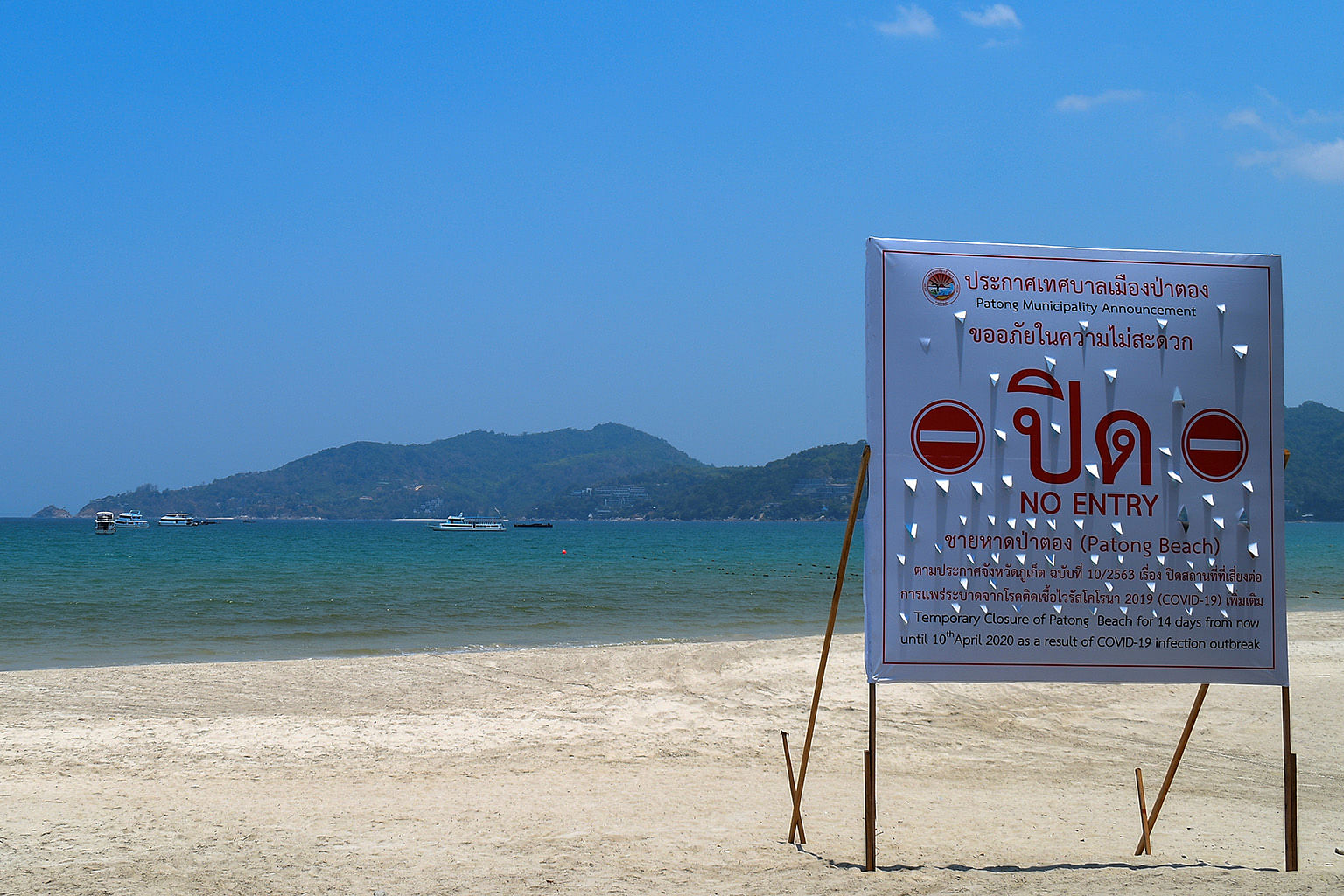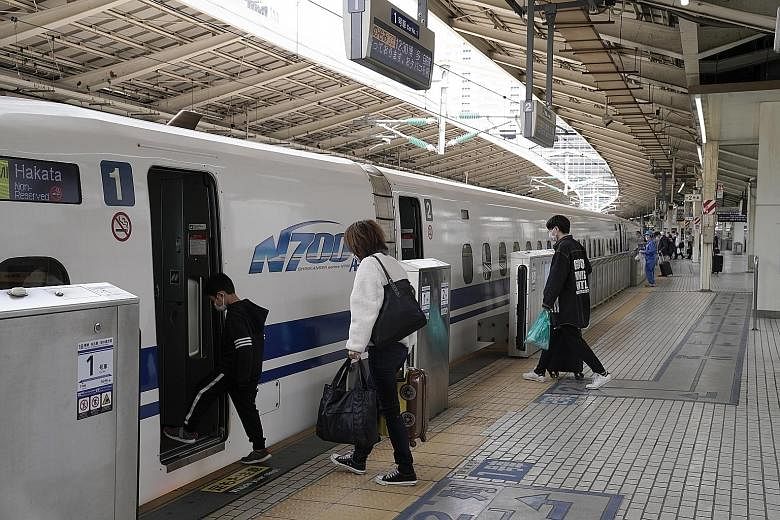This time last year, Chinese guide Francisco Wang was leading a group of 30 on a seven-day packaged tour of Spain and Portugal, with whirlwind stops in Barcelona, Madrid and Lisbon as the group made the most of the Chinese "golden week" holiday.
This year, there is no question of the same trip, with bookings for overseas tours cancelled amid a ban on tour groups leaving the country.
"It's nice to stay home and rest, have a less hectic travel schedule and to spend time with my family, but it's getting worrying, with no income and no sight of when things might improve," said the 33-year-old Harbin native.
Chinese health authorities yesterday reported four new coronavirus cases, taking the total to 82,862. Many parts of the country have lifted travel restrictions but with the pandemic still raging elsewhere in the world, the tourism sector is facing its biggest blow since the advent of modern leisure travel.
Movement restrictions, control measures and reduced flights have meant that tourism has essentially ground to a halt, and is especially glaring this week across East and South-east Asia during the annual regional holiday often referred to as the golden week.
Chinese travellers, whose top international destinations include Thailand, Japan and Singapore, are switching their overseas travel plans to domestic travel but observers say this alone will not be enough to buoy the industry.
Regionally, tourist-dependent Thailand and Hong Kong, for which mainland Chinese visitors form a bulk of their tourism economies, have been hit especially hard.
Thailand's tourism industry in recent years contributed nearly 20 per cent to the economy, with Chinese tourists making up a quarter of visitors to the kingdom.
But with China's lockdown measures in place till the end of May, and Thailand's own moves to stem the virus spread, the Tourism Authority of Thailand expects tourist numbers to fall by 60 per cent this year to 16 million visitors, compared with last year's record of 39 million.

After Thai nature parks were ordered to close in late March while parts of the Andaman coast and Phuket Island were sealed off, tourist boat operators like Mr Atsaree Sophee were forced to shut their businesses and lay off staff.
"I don't expect my business to be like before. I think it will take at least six months for Thai travellers to come back, next year for foreigners," said Mr Sophee, who told The Straits Times that he has switched to fishing in a bid to stay afloat.
In Hong Kong, the tourism industry is in a moribund state with few, if any, inbound visitors from the mainland in March or April.
-
Top destinations for Chinese tourists
-
1. Thailand
2. Japan
3. Hong Kong
4. Indonesia
5. Vietnam
6. Singapore
7. Malaysia
8. Taipei
9. Cambodia
10. Philippines
Numbers are from 2018 as last year's figures are not yet available
SOURCE: CTRIP.COM
Before the pandemic, mainland visitors made up 80 per cent of the city's visitor arrivals. In February, they formed half of the 199,123 visitors, a sharp drop from 5.59 million a year ago.
To help those in the industry, the government rolled out the anti-pandemic fund under which eligible freelance accredited tour guides will receive a monthly subsidy of HK$5,000 (S$910) for six months.
"I had a very busy schedule in the first two weeks of December - a total of 14 jobs in 15 days," said freelance tour guide William Ip.
"(But) my colleagues told me that there were zero jobs from January as those pre-booked tours had to be cancelled and no cruise ships visited Hong Kong."
Meanwhile, Taiwan's tourism authorities estimate the island will lose around NT$57.1 billion (S$2.71 billion) after tourist numbers more than halved in the first quarter of this year.
Even if China has the coronavirus situation under control, the situation in the rest of the world is the roadblock to international travel resuming, industry watchers say.
"The entire travel industry is in a half paralysed state and it's impossible to even come close to the figures of last year," said Mr Song Ding, director of the Tourism and Real Estate Industry Research Centre of the China Development Institute. For a proper recovery, there needs to be outbound travellers, as well as inbound visitors, he noted, adding, however, that the push towards domestic travel is a positive first step.
Domestic travellers are estimated to make 120 million trips during these holidays, according to figures from travel group Trip.com, with self-driving holidays among the most popular.
The pent-up demand following months of travel restrictions was evident on Wednesday, when air ticket sales for Beijing shot up 15 times in 30 minutes after the Chinese capital said visitors from "low-risk areas" no longer have to be quarantined for two weeks when entering the city.
The Forbidden City will also reopen today, three months after it was closed because of the coronavirus. But like most attractions across the country, it will limit the number of visitors.
The sprawling Imperial Palace opposite Tiananmen Square will admit only 5,000 visitors a day, down from 80,000 before the pandemic.
While this sort of disruption is historically unprecedented, it has also exposed the fragility of the travel industry, said independent industry analyst Liu Simin.
"Perhaps we need to look at ways for people to diversify, like many of the tour guides are now selling local produce from the regions they lead tours to, or even going into different industries," he said.
The situation has highlighted the face that domestic tourism may be the fuel that lights the fire for all travel. In South Korea too, nearly 40 per cent of people plan to travel within the country for its equivalent of golden week.
The popular resort island Jeju, home to 600,000 people, is expected to welcome nearly 180,000 visitors over the six-day period.
Over 80 per cent of tickets between Seoul and Jeju have been sold and ticket prices have shot up to more than 100,000 won (S$116) from a current low of 10,000 won to 30,000 won, Yonhap news agency said, citing airlines.
But in neighbouring Japan, an ongoing state of emergency that, in all likelihood, will be extended beyond May 6 means domestic travel is non-existent as people are urged to stay at home.
Last year's golden week holiday set cash tills ringing to the sum of 883.6 billion yen (S$11.6 billion) from about 24 million domestic tourists, said the Yomiuri Shimbun, citing travel firm JTB Corp data.
But calls by national and prefecture leaders for people to stay home have led to downtown areas and tourist sites becoming ghost towns, even if neighbourhood districts remain relatively crowded.
At least one shinkansen bullet train last Saturday, a service plying Tokyo and Yamagata, had no passengers on board.
Flowers that are set to bloom in the fine spring weather have become casualties; to discourage people from gathering in parks, the rose buds of about 3,000 bushes at Yono Park in Saitama, north of Tokyo, were cut, while in Chiba, to the east of the capital, the stems of over 10,000 tulips at the Sakura Furusato Square were mowed.
For those who make their living from inbound and outbound tour groups, like China's Mr Wang, the only option is to try and wait out the dry spell.
"There's nothing much else we can do, or anything else I really know how to do," he said.
• With additional reporting by Chang May Choon in Seoul, Claire Huang in Hong Kong, Walter Sim in Tokyo, Hathai Techakitteranun in Bangkok, Katherine Wei in Taipei











